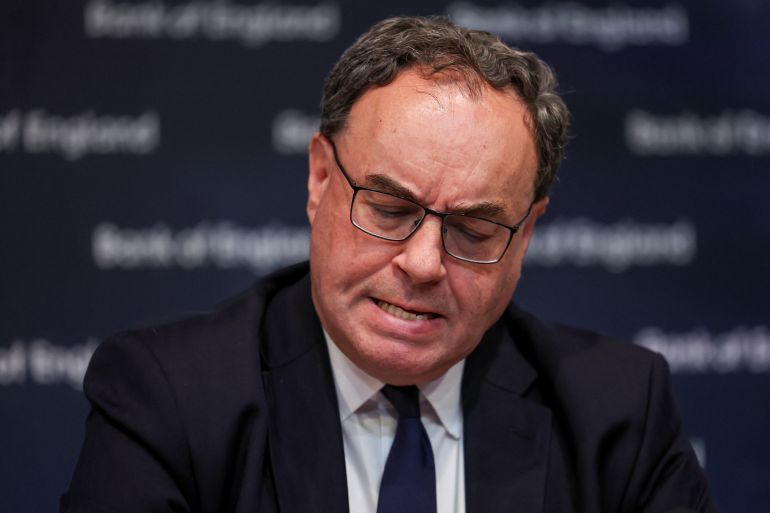UK raises interest rates to highest level since 2008
The quarter of a percentage point rise to 4.5 was expected, but the 12th increase in a row brings concerns.

The Bank of England has raised interest rates to their highest level since late 2008 as it continues to combat stubbornly high inflation in the United Kingdom.
The decision on Thursday by the bank’s nine-member Monetary Policy Committee to lift its main interest rate by a quarter of a percentage point to 4.5 percent was widely anticipated in financial markets.
Keep reading
list of 4 itemsWhy are nations racing to buy weapons?
Parallel economy: How Russia is defying the West’s boycott
US House approves aid package worth billions for Ukraine, Israel
The increase was its 12th in a row. Just two members of the bank’s nine-member panel voted to keep interest rates unchanged.
Bank of England Governor Andrew Bailey told reporters in London after the rate changed: “The rise in bank rates since December 2021 will weigh more on the economy in the coming quarters and the [Monetary Policy Committee] factors this into its policy decisions.”
Like other central banks around the world, the Bank of England has sought to keep a lid on inflation, which over the past year has been fuelled by Russia’s invasion of Ukraine.
That sent energy prices soaring, a development that then led to price increases across a wide array of goods and services.
The Bank of England started raising interest rates in late 2021 from a low of 0.1 percent in order to keep a lid on price rises that were first largely stoked by bottlenecks resulting from the lifting of coronavirus lockdown restrictions and subsequently by the war in Ukraine.
Tasked with keeping inflation at about 2 percent, the bank said inflation would likely fall to about 5 percent by the end of this year.
But it warned there were “considerable uncertainties” over when inflation would return to its target, citing “significant” upside risks.
“If there were to be evidence of more persistent pressures, then further tightening in monetary policy would be required,” the bank said.
Inflation currently stands at just over 10 percent. In documents accompanying its decision, the bank said food prices have stayed higher for longer than expected. As a result, it said, consumer price inflation is expected to decline less rapidly than previously thought.
The interest rate hike will pile more pressure on borrowers, particularly those who have mortgages that track the bank’s headline rate.
Many homeowners will be cushioned from the recent increases because they fixed their mortgages when interest rates were ultra-low during the coronavirus pandemic.
However, those whose fixed-rate terms expire over the coming months will face much higher borrowing rates when they look to lock in new deals.